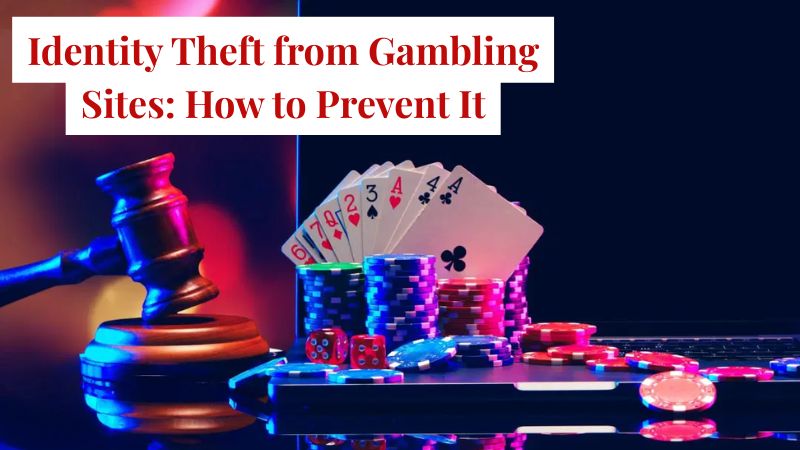
Identity Theft from Gambling Sites: How to Prevent It
- Mitchell Edwards
- 0
- Posted on
Online gambling has become hugely popular. People love the thrill of winning, the excitement of playing, and the convenience of betting from home. But with this rise in popularity comes a serious risk — identity theft. Criminals are looking for ways to steal personal information from gambling websites. If you enjoy online gambling, it’s important to know how to protect yourself. In this blog, we’ll explain how identity theft happens and share simple ways you can stay safe.
How Identity Theft Happens on Gambling Sites
Gambling websites collect a lot of personal data. When you sign up, you usually provide your full name, address, date of birth, email, and banking information. Hackers know this and target these sites to steal valuable data. They may use phishing scams, weak passwords, or fake gambling sites to trick users into giving away their information. Once they have it, they can open credit cards, take out loans, or empty your bank accounts. Understanding how these crimes happen is the first step in protecting yourself.
Use Trusted and Licensed Gambling Sites
Always gamble on trusted and licensed sites. Before signing up, check if the website has a valid license from a reputable authority, like the UK Gambling Commission or Malta Gaming Authority. Licensed sites are required to have strict security measures in place to protect your data. They use encryption technology that makes it difficult for hackers to steal your information. A good rule is to avoid any site that looks suspicious, has bad reviews, or doesn’t clearly show its license details.
Create Strong and Unique Passwords
One of the easiest ways to protect yourself is by creating strong passwords. A weak password is like leaving the front door open for hackers. Your password should be long, include numbers, symbols, and a mix of upper and lower case letters. Never use the same password across different sites. If remembering multiple passwords is hard, consider using a password manager. These tools can generate and store complex passwords for you, keeping your accounts safer.
Enable Two-Factor Authentication
Two-factor authentication (2FA) adds an extra layer of security. With 2FA, even if someone knows your password, they can’t access your account without a second code. This code is usually sent to your phone or generated by an app. Many gambling sites offer 2FA as an option. Always enable it whenever possible. It takes just a few minutes to set up but provides powerful protection against hackers.
Be Careful with Public Wi-Fi
Using public Wi-Fi at cafes, airports, or hotels might be convenient, but it’s also risky. Hackers often target public networks to intercept data. If you log into a gambling site over public Wi-Fi, you could be exposing your personal information. To stay safe, avoid gambling on public networks. If you must use public Wi-Fi, make sure you are connected to a secure VPN (Virtual Private Network). A VPN encrypts your internet traffic and keeps your data hidden from prying eyes.
Watch Out for Phishing Scams
Phishing is a common trick hackers use to steal information. They send fake emails or messages that look like they are from real gambling sites. These messages usually have a link that takes you to a fake website. If you enter your login details there, the hackers steal them. Always be suspicious of emails asking you to “verify your account” or “update your payment details.” Instead of clicking links, go directly to the gambling site by typing the URL into your browser.
Monitor Your Accounts Regularly
Keeping an eye on your gambling account and bank accounts can help you spot suspicious activity early. Check your balances and transactions regularly. Look out for any strange activity you don’t recognize. If you notice anything unusual, contact the gambling site and your bank immediately. Acting quickly can minimize the damage and help you recover faster if your information has been stolen.
Don’t Share Personal Information
Some scammers might pose as customer support agents and ask for your personal information. A real gambling site will never ask for your password, full banking details, or other sensitive information through email or chat. Always be cautious about what you share. If you are ever in doubt, contact the site’s official customer support through their main website. Protecting your personal information is one of the easiest ways to prevent identity theft.
Keep Your Software Updated
Hackers often look for weaknesses in outdated software. That’s why it’s important to keep your computer, mobile device, and apps updated. Software updates often fix security flaws that hackers could exploit. Turn on automatic updates for your devices to ensure you always have the latest protection. Keeping your antivirus program up-to-date is also a smart move. Good antivirus software can block malware that tries to steal your information while you gamble online.
Use Secure Payment Methods
Choose secure payment methods when gambling online. Credit cards and trusted e-wallets like PayPal offer better protection than direct bank transfers. They often come with fraud detection and can help you dispute unauthorized charges. Avoid using unknown payment platforms that are not well-established. Using a separate card just for gambling activities can also help limit your exposure if anything goes wrong.
Conclusion
Identity theft from gambling sites is a real and growing threat. But by taking a few simple steps, you can protect yourself and enjoy online gambling safely. Always choose licensed sites, create strong passwords, enable two-factor authentication, and be careful with public Wi-Fi. Watch out for phishing scams, monitor your accounts regularly, and keep your devices updated. Protect your personal information and use secure payment methods. Being smart and cautious will make a big difference. Stay safe and keep the fun in online gambling!
